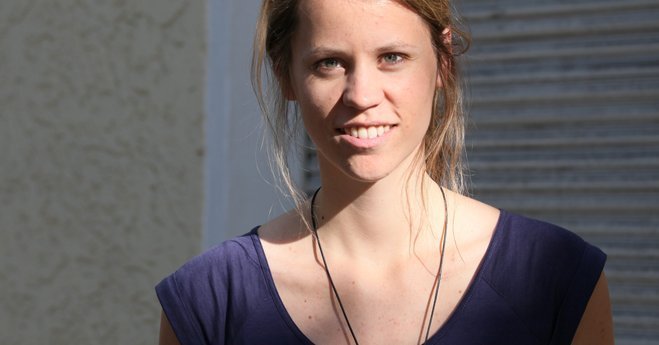At the age of 28, Daphne Büllesbach has studied European affairs, political science and sociology at London and at Cambridge. She was in charge of coordinating the activities of the Festival in the capital of Germany. In an interview with Treffpunkt Europa, (the German version of the Taurillon and the New Federalist), she gave us her impressions. She refers to the impact of the Festival on the public, and talks of a form of normalization for the European project for younger generations and confides in us her goal: creating a European identity.
The New Federalist : Daphne, the TransEurope Festival has just ended. Looking back, was it a success? Has it really worked well?
Daphne Büllesbach: From a Berlin point of view, the answer is yes. For what was only the first edition, we succeeded in putting the Festival on foot. Especially since it took place in Berlin, where political offer is important, and where it is possible to find all kinds of events every night. The night where we organized a debate for the Festival, there were four other really interesting events that everyone could have gone too as well. It was therefore important that we cooperated with our partners, and we will continue to do so. I think that the Festival was a success, although there could have been more people there.
The New Federalist : Do you think that the Festival did not have enough impact on the public?
Daphne Büllesbach: No, I would not say that. In fact, the people there were very engaged. We had some really fascinating discussions; many of the people have told us that they found our project exciting, and they would gladly participate!
The New Federalist : In your opinion, why were there less participants there than you might have expected? Is the subject of “Europe” likely to deter the public?
Daphne Büllesbach: I think that many people associate Europe with Brussels, and with bureaucracy. But that doesn’t seem to be the main reason. There are always a number of reasons for which to engage in a certain cause! And maybe we haven’t been sufficient in our approach. It’s also up to us to get people, so that they become interested in the subject.
The New Federalist : In the debate on Europe, what are the missing themes? Which ones could generate interest amongst the public?
Daphne Büllesbach: Media discourse- at least when we stay in the mainstream (public)- addresses only part of the question and focuses on the crises. Talking all of the time of the crisis of the Euro isn’t likely to bring in the crowds, although this is still a very important theme! This is not the way we are going to create a public European space, a space that brings interested people together, deeply European, and ready to say, “We want to push the cooperation beyond borders of national states; we believe in the cooperation and the community that already exist”.
The New Federalist :Would you go as far as to say that the project of European unity is threatened?
Daphne Büllesbach : It’s a difficult question, especially since everyone always speaks from their own point of view. Since I’m an optimist, I would tend to say no. We have already come so far! No, I do not think that the European project is threatened. On the other hand, if we did a survey, the majority of the people would probably answer that Europe is no longer capable of undertaking anything! So maybe yes, to the extent that in a period of crisis, people think back to nation states.
This is where we have to make a difference. On one hand, there is a Europe that was set up by responsible politicians and in which governments cooperate. And this Europe is currently in bad shape: one scarcely sees any solidarity. But at the same time, there is also a Europe of European citizens, who identify with Europe, but cannot recognize themselves within the governments, the Commission or more generally the institutions in Brussels. The difference between the two contexts is very important to us. We believe in the ideal of the European Community, but we observe with a critical eye what is coming from Brussels.
The New Federalist : Is it a question of generation? Do young people feel like they belong to the European community compared to the elderly who are more critical?
Daphne Büllesbach: No, I don’t think so. It is interesting because during the Festival, we posed a question similar to Ska Keller, a thirty years old MEP who sits in the European Parliament for the Greens. And what she said, is that Europe to her is something normal. Her colleagues of about sixty years old marvels to see the young Europeans constantly exchanging with one another. For them, it is really something special.
But for us, for our generation, and certainly for those who can afford it, this cooperation goes without saying: we are the Erasmus generation. This sense of normalcy, it should not be underestimated. This is an incredible evolution that didn’t exist fifty years ago. For the older generations, it is still something special, but not for us. It is a major step forward that needs to progress further: ensure that everyone moves even further towards this normalcy. The older generations remains on the idea that it is great that we have not had a war in Europe for 60 years. For us young people, it’s normal, and we can’t derive much from that...For us, the ability to communicate and travel beyond borders is part of reality.
The New Federalist: So you think it is important to commit yourself within TransEuropa?
Daphne Büllesbach: I think that the populations of European spaces, who have already made incredible advances in terms of integration, still need to share more and keep moving forward. As youth, we have already benefited from this process of integration. It is important that the crisis doesn’t make us fall back into nationalistic approaches, and that Europe still pushes for this normalcy. What should be said: “We live in a European space that has to continue to act responsibly and in solidarity with other states,” instead of just hearing, “We are paying for Greece.”
Of course, this is a special case; of course this is an extreme example. But what we need is something that can be defined as European identity, an identity in which people can recognize themselves. It is without a doubt a difficult project. The other problem, is that the integration process has been pushed so far inside of our borders, that we are undergoing a reverse process of closing external borders. We need to keep this drift. This space within the borders of Europe should be open to others, and not only reserved for certain Europeans.



Follow the comments: |
|
